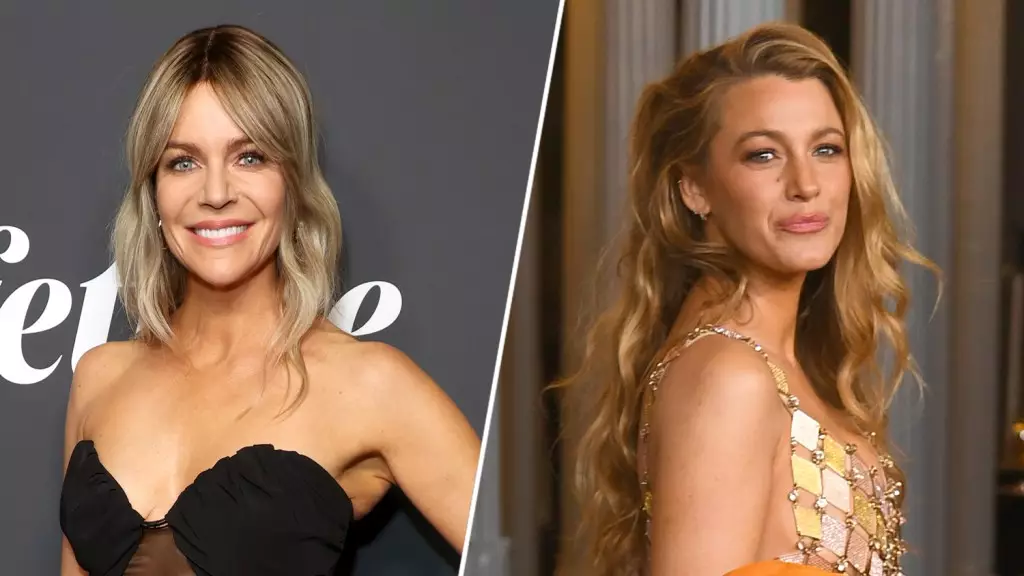The recent allegations made by actress Blake Lively against Justin Baldoni, the director of “It Ends with Us,” have stirred significant attention within the entertainment community. Support for Lively has garnered momentum, most recently with actress Kaitlin Olson voicing her solidarity through social media. Olson referred to Lively as a “kind, lovely, honest and generous person” while sharing a relevant article detailing Lively’s claims of sexual harassment and retaliation. This public backing not only amplifies Lively’s voice but shines a spotlight on the broader issue of power dynamics in Hollywood.
Lively’s allegations are not mere claims; they illustrate a disturbing pattern that highlights the issues of accountability and protective measures within the film industry. Olson’s connection to Lively, facilitated through their spouses who co-own the Welsh football club Wrexham A.F.C., further emphasizes the tight-knit nature of celebrity relationships, where public support can serve as a powerful tool in the fight against workplace misconduct.
Blake Lively has leveled serious accusations against Baldoni, claiming that he and his production company, Wayfarer Studios, engaged in sexual harassment and a systemic campaign to undermine her reputation. In her 80-page complaint filed with the California Civil Rights Department, Lively meticulously recounts the hostile work environment that purportedly put the filming of the project at risk.
The complaint suggests that Baldoni not only harassed her but employed a sophisticated strategy involving digital manipulation to retaliate against her for speaking out. Lively’s assertion that these actions were designed to intimidate her and silence others who might come forward speaks volumes about the culture of fear that can permeate creative industries. Detailed text messages between Baldoni and public relations specialists reveal a troubling orchestrated push to control the narrative, thereby limiting Lively’s ability to disclose her experiences.
Baldoni has vehemently rejected Lively’s allegations, branding them as “completely false” and an attempt to tarnish his image. His lawyer, Bryan Freedman, has described Lively’s claims as intentionally sensationalized with the aim of public malignment. Interestingly, a counter-narrative is being prepared by Baldoni, reportedly set to unfold in the New Year, indicating a possible escalation of legal battles. This back-and-forth highlights the complex interplay between public perception and private grievances.
In a twist, Stephanie Jones, who previously worked with Baldoni, has also initiated legal action against him and others, claiming defamation. This development complicates the situation further, showcasing the multi-layered conflicts that often arise in such disputes. Accusations of manipulative behavior underscore how challenging it can be to navigate allegations of this nature amidst high-stakes reputational warfare.
Implications for Hollywood’s Future
The unfolding saga between Lively and Baldoni is more than a celebrity spat; it reflects broader issues pervasive in Hollywood, particularly concerning gender dynamics, the treatment of women, and the retaliatory mechanisms utilized by powerful individuals to silence victims. The wave of public support for Lively can be viewed as a significant step towards establishing a more supportive environment for those who dare to speak out against misconduct.
As society continues to grapple with the cultural shifts brought on by movements like #MeToo, high-profile cases like this serve to remind us of the enduring challenges that remain. With the involvement of numerous parties, including actors, publicists, and legal counsel, the complexities of this case signify just how intricate the fabric of Hollywood can be when intertwined with matters of ethics, legal recourse, and public scrutiny.
Ultimately, the situation surrounding Blake Lively and Justin Baldoni is emblematic of a transformative moment in the entertainment industry. As more voices join the chorus of support for Lively, the message becomes clear: the imperative to combat harassment and seek accountability must not fade into the background. The ensuing legal battles, revelations, and public discussions will undoubtedly shape the landscape of Hollywood for years to come, pushing the industry closer toward justice and transparency for all its members.

